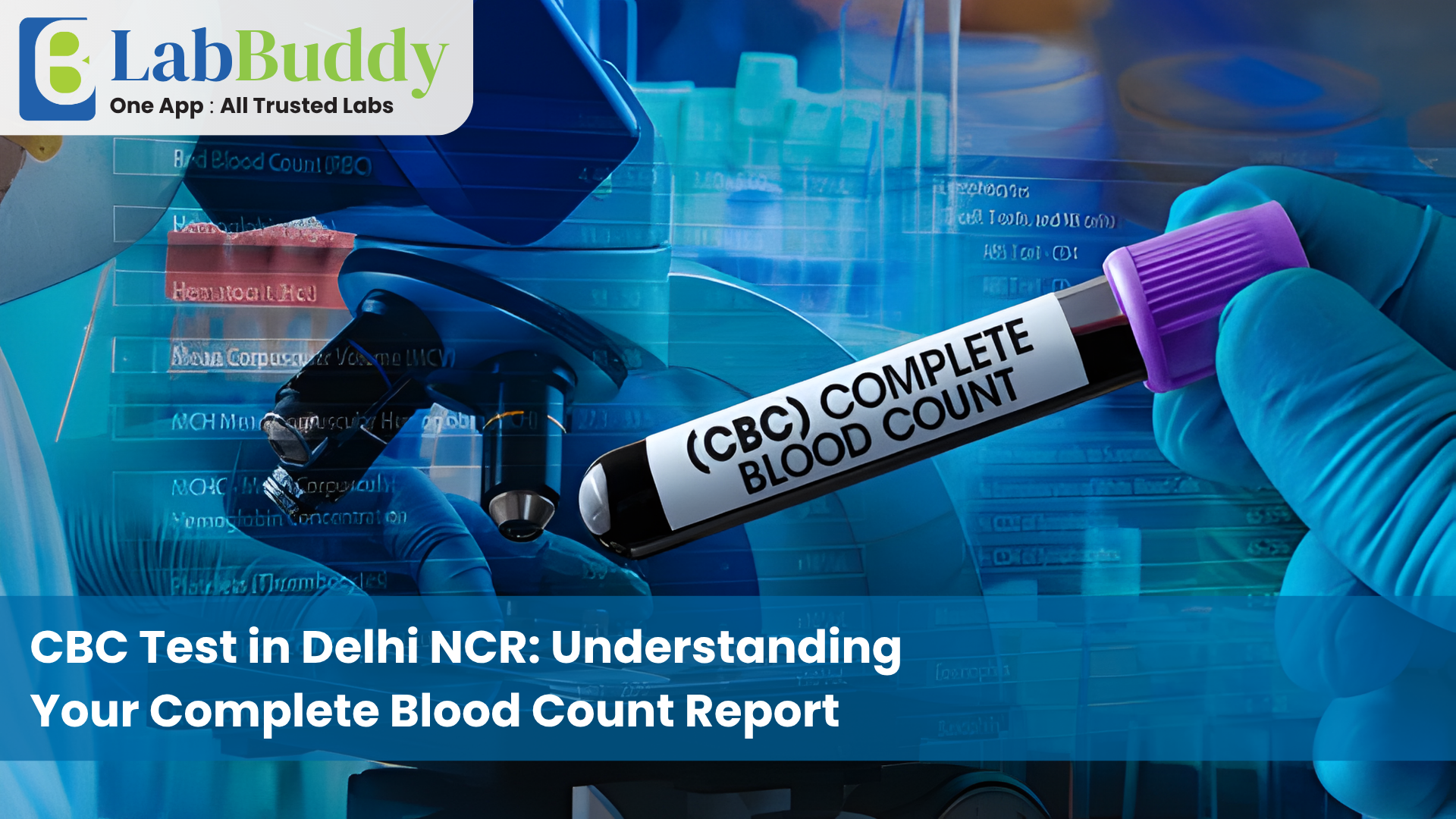Comprehensive Vitamin and Nutritional Deficiency Testing in Delhi NCR
Published by LabBuddy Team | 10 minutes read

Nutritional Health in Delhi NCR: The Urban Deficiency Epidemic
In the fast-paced, pollution-laden environment of Delhi NCR, nutritional deficiencies have emerged as a silent health challenge affecting millions. Despite abundant food availability, urban lifestyles, environmental factors, and dietary patterns contribute to widespread nutritional imbalances.
Delhi NCR Nutritional Landscape:
- 80% of population deficient in Vitamin D
- High prevalence of micronutrient deficiencies
- Sedentary work cultures impacting nutrition
- Limited sunlight exposure
- Processed food consumption
- Stress-induced metabolic disruptions

Essential Vitamin and Nutrient Deficiency Tests
1. Vitamin D Test
Measures 25-hydroxyvitamin D levels.
Normal Range: 30-50 ng/mL
Urban Significance:
- Critical for bone health
- Immune system regulation
- Mood and mental health
- Reduced by indoor lifestyles
- Impacted by pollution and limited sunlight
2. Vitamin B12 Test
Assesses cobalamin levels crucial for neurological function.
Normal Range: 200-900 pg/mL
Importance:
- Neurological health maintenance
- Red blood cell formation
- Energy metabolism
- Particularly critical for vegetarians
- Affected by stress and dietary patterns
3. Iron Studies
Comprehensive assessment of iron metabolism.
Key Parameters:
- Serum Iron
- Ferritin
- Total Iron Binding Capacity (TIBC)
- Transferrin Saturation
Clinical Significance:
- Anemia detection
- Metabolic health assessment
- Energy level indicators
- Particularly important for women
4. Vitamin B9 (Folate) Test
Measures folic acid levels.
Normal Range: 2.7-17.3 ng/mL
Health Implications:
- Cell growth and reproduction
- Pregnancy health
- Cardiovascular function
- Mental health support
5. Vitamin A Test
Assesses retinol levels.
Normal Range: 20-50 μg/dL
Diagnostic Value:
- Vision health
- Immune system function
- Skin and mucous membrane health
- Cellular growth and differentiation

Urban Nutritional Challenges
Environmental Factors
- Air pollution nutrient absorption interference
- Limited outdoor activities
- Reduced sunlight exposure
- Chemical contaminant interactions
- Chronic stress metabolic disruptions
Lifestyle Contributors
- Irregular eating patterns
- High-stress work environments
- Processed food consumption
- Limited physical activity
- Inadequate sleep
- Excessive caffeine and alcohol intake

Who Should Get Nutritional Testing
High-Risk Groups
- Vegetarians and vegans
- Individuals with chronic fatigue
- People with digestive disorders
- Pregnant and lactating women
- Elderly individuals
- Those with autoimmune conditions
- Individuals with unexplained symptoms
Corporate Sector Screening
- IT professionals
- Management executives
- Shift workers
- High-stress job roles
- Call center employees

Preparing for Nutritional Deficiency Tests
Pre-Test Considerations
- Some tests require fasting
- Continue regular medications
- Stay hydrated
- Avoid supplements before testing
- Inform doctor about dietary habits
- Provide comprehensive medical history
Factors Affecting Results
- Current medication
- Dietary patterns
- Stress levels
- Sleep quality
- Physical activity
- Underlying health conditions

Understanding Test Results
Interpretation Guidelines
- Optimal Levels: Healthy nutritional status
- Borderline Levels: Potential deficiency risk
- Deficient Levels: Requires immediate intervention
Comprehensive Assessment
- Individual nutrient levels
- Interrelationship between nutrients
- Potential underlying health conditions
- Personalized nutritional recommendations

Nutritional Intervention Strategies
Dietary Modifications
- Balanced macronutrient intake
- Whole food prioritization
- Reduced processed food consumption
- Increased plant-based nutrition
- Mindful eating practices
Supplementation Approach
- Targeted nutrient replacement
- Professional guidance
- Periodic reassessment
- Quality supplement selection
- Personalized dosage

Technology in Nutritional Health
Advanced Monitoring Tools
- Continuous nutrition tracking
- AI-powered dietary recommendations
- Personalized nutrition apps
- Genetic nutritional profiling
- Metabolic health integration

Cost and Accessibility
Testing Costs in Delhi NCR
- Basic Vitamin Panel: ₹1,500-₹3,000
- Comprehensive Nutritional Assessment: ₹3,000-₹6,000
- Advanced Metabolic Nutrition Profile: ₹6,000-₹10,000
Insurance Coverage
- Corporate wellness programs
- Preventive health packages
- Select health insurance plans
- Government health initiatives

LabBuddy's Nutritional Testing Approach
Comprehensive Services
- 250+ labs across Delhi NCR
- Home collection options
- Quick booking
- Transparent pricing
- Digital report delivery
- Nutritional consultation support
- Personalized health recommendations
Emerging Research and Future Trends
Precision Nutrition
- Genetic nutritional profiling
- Personalized dietary interventions
- Advanced metabolic mapping
- Individual microbiome analysis
Digital Health Integration
- AI nutritional prediction
- Comprehensive health tracking
- Personalized lifestyle recommendations
- Seamless healthcare experience
Conclusion
Nutritional deficiency testing is a critical component of preventive healthcare in Delhi NCR's complex urban environment. By understanding your unique nutritional profile, you can take targeted steps to optimize health, enhance energy levels, and mitigate potential long-term health risks.
Regular testing, comprehensive understanding, and personalized nutritional management are key to navigating the nutritional challenges of our rapidly evolving urban ecosystem.
Remember, nutrition is deeply personal. Always consult healthcare professionals for personalized medical advice and interpretation of your specific test results.



